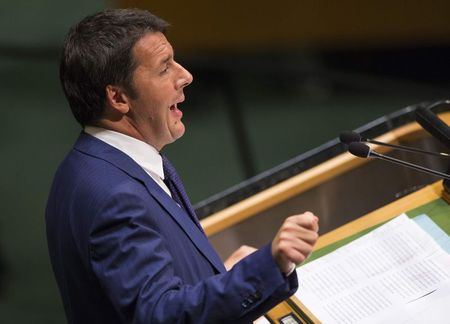By Roberto Landucci and Francesca Piscioneri
ROME (Reuters) - Italian Prime Minister Matteo Renzi prepared for a showdown with the old guard of his centre-left Democratic Party on Monday over plans to overhaul job-protection guarantees as part of a broad reform of labour market rules.
Under mounting pressure to deliver on his ambitious reform promises, Renzi told Democratic Party leaders that the party had to overcome a "taboo" against changing rules that date from 1970 during Italy's postwar economic boom.
The 39-year-old prime minister has staked his credibility on reform, accusing the left of waging an ideological battle over outdated rules that unfairly favour employees of big companies but leave others in the cold.
"You can't create jobs by defending rules of 44 years ago, you create it by innovation" he said.
With the economy set to contract for a third year running in 2014 and unemployment at levels not seen since the 1970s, job creation is an urgent priority for Renzi, who came to power in February promising sweeping reforms to lift Italy out of its worst slump since World War Two.
The job-protection measures enshrined in Article 18 of the workers' statute guarantee that employees dismissed without proper justification must be reinstated. But they only cover those in companies with more than 15 employees.
Fiercely defended by unions, whose shrinking power base is in Italy's declining heavy industry and public service, they leave workers in small firms as well as a growing army of often younger workers on insecure short-term contracts, with virtually no protection or welfare support.
Leftists have accused Renzi of choosing the issue to prove his reform credentials to European Union partners and back up his calls for more flexibility on budget rules. Susanna Camusso, head of Italy's largest union, the CGIL, said the union was ready to go on strike if Renzi did not change course.
Renzi has proposed replacing the complicated mass of short-term contracts with a simpler system in which worker protection would increase with seniority, leaving employers free to lay off staff in the early years of their employment.
That is rejected by unions who say that instead of scrapping Article 18, protection should be extended to all workers.
"We should protect people who have no protection without taking away guarantees from anyone," Luigi Angeletti, secretary of the UIL said on Monday.
IMPACT UNCLEAR
The actual impact of the rules on day-to-day industrial relations appears to be limited, with figures cited by both Renzi and the CGIL showing fewer than 3,000 workers were reinstated last year because of Article 18.
Federico Ghizzoni, chief executive of Unicredit, one of Italy's biggest banks, said that cuts to payroll taxes would probably help employers more but that the whole system of labour market rules needed overhauling.
"Article 18 is important but more from a psychological level than anything else," he said. "No respectable company hires people with the idea of firing them later."
But the issue is heavily symbolic of the problems in reforming a labour market in which millions of Italians have been condemned to short-term, insecure jobs or excluded altogether as the economic crisis has deepened.
Unions say scrapping Article 18 will do little to create jobs in an economy now back in its third recession in six years and will simply punish workers, many on low pay, who are already bearing the brunt of the crisis.
Renzi says that as well as being unfair to workers without protection, the rules deter foreign investors wary of being trapped in long and unpredictable court battles with sacked employees claiming reinstatement.
Former Prime Minister Mario Monti partially changed the system in 2012. But it is unclear how much reforming job protection rules will help a country that has seen its manufacturing capacity cut by 15 percent and industrial output fall more than 25 percent since the economic crisis began in 2007.
Official unemployment runs at almost 13 percent with youth unemployment at nearly 43 percent but even the stark headline rate obscures the real scale of the problem.

Italy has fewer people in work than most of its competitors, with an employment rate last year under 60 percent, worse than any other European Union country apart from Greece, Spain and Croatia. In the poor south of the country, only 4 in 10 of working age people are in work.
(Additional reporting by Gianluca Semeraro in Milan; Writing by James Mackenzie; Editing by Robin Pomeroy and Hugh Lawson)
